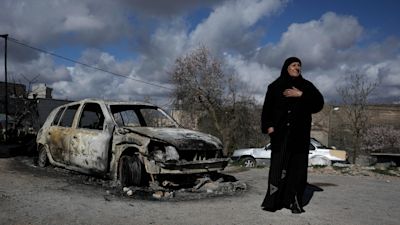Insight
The gun or the olive branch? Hopes for peace deal fade in the Holy Land

Words by ITV News Senior Foreign Editor John Angier
Will the world ever see an Israeli state and a Palestinian state existing peacefully side-by-side? It has been the goal of the international community for decades.
Never has it looked further from becoming a reality. Israel’s new right-wing coalition government includes parties that are vehemently opposed to the so-called two state solution.
The new security minister, Itamar Ben-Gvir, is head of the far-right Jewish Power party, which wants one Israeli state encompassing the land between the Mediterranean and the River Jordan.
That would mean Israel annexing the West Bank (known also as Judea and Samaria), territory that it has occupied since the Six-Day War in 1967 and where around three million Palestinian Arabs live.
One of Ben-Gvir’s closest advisers is Yishai Fleisher, a highly articulate former paratrooper, lawyer and rabbi.
We met him in the West Bank city of Hebron, site of the tomb of Abraham and a place of huge importance to Jews, Muslims and Christians.
'We don't see ourselves as being occupiers in our ancestral homeland,' said Yishai Fleisher
In Hebron’s ancient centre, around 800 Jewish settlers live with military protection in tense disharmony with the majority Palestinian population. Yishai Fleisher could hardly have been clearer about the idea of creating a Palestinian state in the West Bank. “Do I deny the idea that there should be a Palestine here, do I deny Palestinian self-determination? The answer is: absolutely. I deny with every fibre of my being any claim that there is another sovereign entity that has a historical right to be here. “We have every right to be here, this is our ancestral land and I deny from beginning to end any claims of Palestine on the historic land of the Jewish people”, he said.
With ideology like that embedded in the new government, the process of Jewish settlement in the West Bank is expected to accelerate. The settlements are regarded as illegal by the international community, an allegation rejected by Israel.
New figures suggest there are now more than half a million settlers, living on land to which they believe they have a religious and historical right. We went to one settlement outpost which has existed since 2002, Khavat Gilat near Nablus, and spoke to Ilana Shimon, a mother of ten children. There is no question in her mind that she belongs here. “We believe in the Bible,” she said. “We believe that this is our land, this is our country and we want to be here. It’s important to us.” Settlers like Ilana represent facts on the ground: a growing practical obstacle to a Palestinian state. It is hard to imagine any Israeli government forcing them to leave in order to hand over the territory to a new Palestine.
The mood among many Palestinians is becoming increasingly desperate. Back in Hebron, activist Mohanned Qafesha said: “I don’t think there is any reason that justifies what is happening to us here. You cannot walk freely on the streets. You’re threatened. Your life is threatened. You feel like you’re going to be shot at any moment.“
The US Secretary of State Antony Blinken arrived in the region this week amid one of the worst outbreaks of violence for many years: 35 Palestinians killed in January and seven Israelis shot dead outside a synagogue. Blinken repeated the mantra of the two-state solution and urged Israelis and Palestinians to work together to end the cycle of bloodshed. There is no sign of that happening, as Israel sends more soldiers into the West Bank and Palestinian militants vow to destroy Israel. In 1974 the Palestinian leader Yasser Arafat made a speech to the UN in which he used a famous metaphor for the choice between peace and violence.
“I have come bearing an olive branch and a freedom fighter’s gun,” he said. “Do not let the olive branch fall from my hand. I repeat: do not let the olive branch fall from my hand.” Almost half a century on, whatever one’s view of the man who spoke those words, it is clear the gun is in the ascendant.
Want a quick and expert briefing on the biggest news stories? Listen to our latest podcasts to find out What You Need To Know